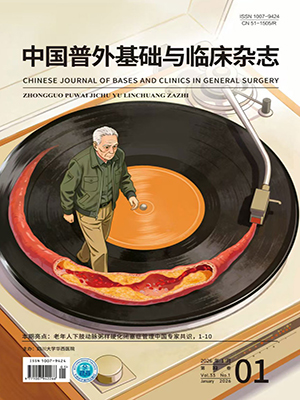Objective To investigate the effects of N-acetylcysteine (NAC) on the intestinal barrier in rats with severe acute pancreatitis (SAP) and its possible mechanism.
Methods Eighty Wistar rats were randomly (random number method) divided into normal control group (CON group, n=8), sham operation group (SO group, n=24), SAP group (n=24), and NAC group (n=24), then the rats of latter 3 groups were sub-divided into 6, 12, and 24 hours group, each time point group enrolled 8 rats, respectively. Rats of CON group didn’t receive any treatment. SAP rat models were established by injecting 5.0% sodium taurocholate into the biliary-pancreatic duct for SAP group and NAC group, while rats of SO group were injected normal saline instead of sodium taurocholate. The rats of NAC group were given an intraperitoneal injection of NAC at 1 hour before operation, and the rats of SO group and SAP group were given an intraperitoneal injection of normal saline instead at the same time. Rats of CON group were sacrificed to get ileum (about 5cm) and blood from right ventricular (5mL) for further test, and rats of the other 3 groups were sacrificed at 6, 12, and 24hours after operation. Then the levels of amylase (AMY), C-reactive protein (CRP), endotoxin, D-lactic acid, and diamine oxidase (DAO) in plasma, the levels of superoxide dismutase (T-SOD), myeloperoxidase (MPO), and malondialdehyde (MDA) in ileum tissues were tested. Apoptosis of mucosal cells in ileum tissues was determined by terminal deoxynucleotidyl transferase-mediated dUTP nick end labeling (TUNEL). Pathological changes in ileum tissues were observed and scored. Expression levels of bax and bcl-2mRNA in ileum tissues were determined by real-time
fluorescence quantitative PCR (real-time PCR), and related proteins were tested by Western blot method, respectively.
Results Compared with SAP group at the same time point, the levels of CRP in NAC group were lower at all the 3 time points (P<0.05) and AMY were lower at 12 and 24 hours (P<0.05), levels of DAO, endotoxin, and D-lactic acid were lower at 12 and 24 hours (P<0.05), but level of DAO was higher than SAP group at 6 hours (P<0.05). Compared with SAP group at the same time point, the levels of MPO and MDA in ileum tissues were lower in NAC group at all the 3 time points (P<0.05), but levels of T-SOD increased significantly at 12 and 24 hours (P<0.05). Compared with SAP group at the same time point, the apoptosis indexes were lower in NAC group at all the 3 time points (P<0.01), and pathologic scores of ileum tissues were lower at 12 and 24 hours (P<0.05). The pathological changes under a light microscope were observed better in NAC group than that of SAP group at each time point. Moreover, compared with SAP group at the same time point, the expression levels of bax mRNA and protein were lower in NAC group at all the 3 time points (P<0.05), while higher in bcl-2 mRNA and protein (P<0.05).
Conclusions NAC can protect the function of small intestinal barrier, and can alleviate SAP-induced injury of the intestinal mucosa. In addition to antioxidant effects, the underlying mechanisms also may include the anti-apoptotic effects.
Citation: WANG Yingzhen,NIU Tianping,CAO Yunhua,WANG Jun,LI Zili,XIAO Wen,ZHANG Youcheng,WANG Shiwen.. Experimental Study of Protective Effects of N-Acetylcysteine on The Intestinal Barrier in Rats with Severe Acute Pancreatitis. CHINESE JOURNAL OF BASES AND CLINICS IN GENERAL SURGERY, 2013, 20(3): 271-279. doi: Copy
Copyright ? the editorial department of CHINESE JOURNAL OF BASES AND CLINICS IN GENERAL SURGERY of West China Medical Publisher. All rights reserved
-
Previous Article
Surgical Treatment for Patients with Persistent Truncus Arteriosus Who Missed Optimal Timing of Surgery -
Next Article
食管癌術后下消化道出血的診治分析




